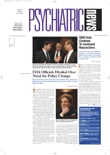Neurophysiological systems that regulate sleep influence and are influenced by affective, behavioral, and cognitive development in children and adolescents, according to Anna Ivanenko, M.D., Ph.D., an assistant professor of psychiatry at Loyola University Medical Center in Chicago.
“There's compelling evidence that it's a bidirectional process,” said Ivanenko, one of more than two dozen speakers at a conference on pediatric sleep medicine sponsored by Brown Medical School in Providence, R.I., at Amelia Island, Fla., in February.
The conference attracted 130 psychiatrists, psychologists, pediatricians, pulmonologists, neurologists, nurses, and other health care professionals who work in pediatric sleep.
As many as 27 percent of parents in various surveys report that their 4- to 12-year old children have sleep problems. Pediatric psychiatric patients, Ivanenko said, often describe symptoms of bedtime refusal, fear of the dark, fear of dying in sleep, nightmares, and night terrors. Adolescents with sleep difficulties are more likely than peers who sleep well to report symptoms of depression, anxiety, poor self-esteem, and emotional lability; they also are higher users of nicotine, caffeine, and alcohol than their peers.
Primary sleep disorders, such as sleep-disordered breathing (SDB), often instigate emotional and behavioral problems in children, Ivanenko said. SDB causes excessive daytime sleepiness that may interfere with classroom performance.
SDB also may trigger symptoms of attention-deficit/hyperactivity disorder (ADHD). Two other sleep disorders, periodic limb movement disorder and restless legs syndrome, are associated with ADHD. Children with ADHD display more bedtime resistance and sleep less soundly than healthy children.
Children with depression frequently have trouble falling asleep and staying asleep. Polysomnographic and neuroendocrine studies in children and adolescents with depression fail to show consistent changes in sleep architecture that parallel those seen in depressed adults, Ivanenko and colleagues reported in the April Sleep Medicine Reviews.
While sleep problems are part of the symptomatology of bipolar disorder, Ivanenko said, sleep characteristics in children with this disorder so far have had little study.
Children with pervasive developmental disorders have trouble falling asleep and prolonged and frequent nighttime awakenings. They get less sleep on average than healthy children do and more often exhibit irregular sleep patterns and unusual sleep behaviors.
Behavioral and pharmacological therapies reportedly help children who sleep poorly, Ivanenko said. But there's a paucity of well-designed research studies that evaluated such interventions.
Child psychiatrists, Ivanenko asserted, “tend to ignore sleep disorders or attribute problems entirely to the primary type of behavioral or psychiatric disorder they are treating.” Sleep clinicians, however, sometimes underestimate the behavioral and emotional impact of sleep disorders, she said.
Few physicians know how to take an adequate sleep history, said Richard Ferber, M.D., who directs the Center for Pediatric Sleep Disorders at the Children's Hospital of Boston. Many give simplistic advice based on incomplete knowledge of sleep disorders and sleep development that is not tailored to the needs of the individual child and family.
Physicians as well as parents today, however, show greater awareness that sleep problems in children may manifest as problems with daytime learning, attention, and behavior rather than overt somnolence, said Timothy Hoban, M.D., a clinical associate professor of pediatrics and neurology at the University of Michigan, Ann Arbor.
Traditional medical clinics that treat children with headache, cancer, rheumatoid arthritis, and other chronic illnesses, as well as pain, present many opportunities to address sleep problems, said Tonya Palermo, Ph.D., an assistant professor of anesthesiology and psychiatry and director of the behavioral program in the Pediatric Pain Management Center at Oregon Health and Science University in Portland.
In her pain clinic, “sleep problems are routine,” she said.“ We always ask about them.” Many children experience years of failed medical treatment before coming to see a pain specialist. As a consequence, many also report long-standing sleep problems. Sleep disturbances, she said, affect quality of life across multiple domains.
Children hospitalized for any reason, Palermo noted, experience interruptions in schooling and loss of their usual routines. While such children often sleep poorly, simple behavioral interventions, including reassurance of the temporary nature of the problem, can help curtail their difficulties.
Orna Tzischinsky, Ph.D., of the Rambam Medical Center in Haifa, Israel, found obese children who binge eat take longer to fall asleep and spend more time awake at night than obese children who do not binge. Both groups sleep more poorly than age-matched normal weight controls. She and colleagues studied 36 obese children, whose mean age was 9 years, and 25 healthy children using actigraphs, questionnaires, and sleep diaries. Among the obese youngsters, 13 reported two or more binge episodes a week, while 23 said they did not binge. The study highlights the need for early intervention to treat sleep problems in obese children, she said, especially those who binge.
The National Institute of Mental Health (NIMH) supports research on how psychiatric disorders, including those affecting sleep, relate to state regulation in young children, said Rebecca DelCarmen-Wiggins, Ph.D., chief of the NIMH's sleep, biological rhythms, and regulatory disorders program.
Current areas of emphasis in her program include effects of brain maturation on mechanisms involved in sleep problems, the impact of periods of rapid development and associated neuroendocrine changes on risk or resilience, identification of at-risk individuals, and development of interventions to prevent onset or progression of psychopathology.
Regulatory functioning is a central theme of a book DelCarmen-Wiggins co-edited, Handbook of Infant, Toddler, and Preschool Mental Health Assessment (Oxford University Press, 2004). It includes two chapters on sleep disorders. ▪
